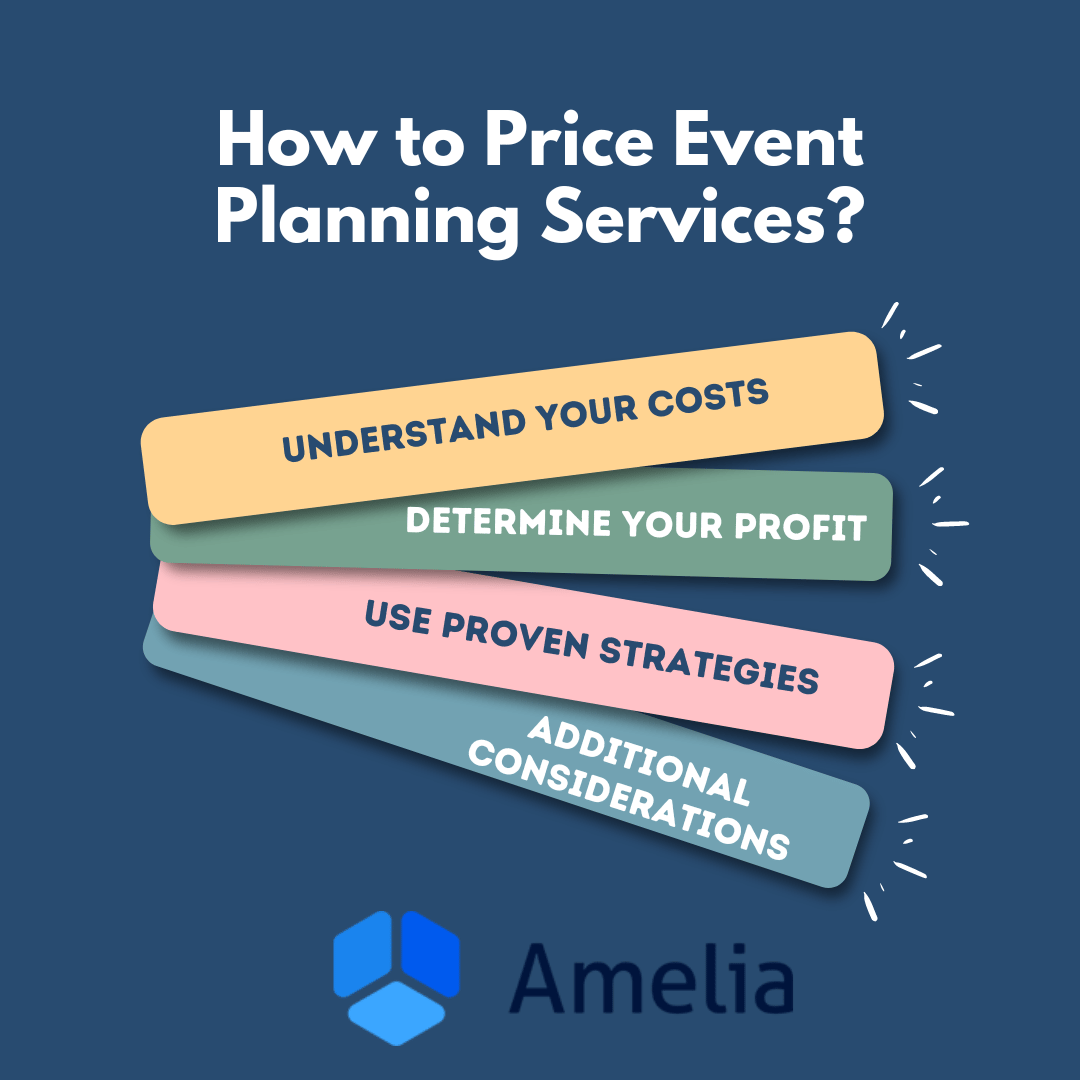Pricing your event planning services is harder than it seems and you know it.
It’s essential to strike the right balance between covering your costs and being competitive in the market. This guide will provide you with a step-by-step approach to determining a fair and profitable pricing strategy.
By understanding your costs, calculating your desired profit margin, and exploring different pricing strategies, you can confidently set rates that reflect the value you bring to your clients.
Let’s dive in and discover how to price your event planning services effectively.
Understanding Your Costs
To accurately price your event planning services, it’s crucial to have a clear understanding of your expenses. These costs can be categorized into direct and indirect costs.
Direct costs:
- Venue rental: The cost of renting the space for your event.
- Catering: The cost of food and beverages for attendees.
- Entertainment: The cost of hiring entertainers, musicians, or speakers.
- Decor: The cost of decorations, centerpieces, and other visual elements.
- Equipment: The cost of rental equipment, such as sound systems, lighting, and stage setups.
Indirect costs:
- Overhead expenses: The ongoing costs of running your business, including office space, utilities, insurance, and administrative salaries.
- Marketing and advertising: The cost of promoting your services and attracting new clients.
- Team salaries and benefits: The cost of paying your employees and providing them with benefits.
- Professional fees: The cost of licenses, permits, and other professional fees associated with your business.
Determining The Profit Margin for Your Event Planning Services
Once you have a clear understanding of your costs, the next step is to determine your desired profit margin. This is the amount of money you want to make on top of your expenses. Your profit margin should be based on several factors, including:
- Your experience: More experienced planners may be able to charge higher rates.
- Market competition: Research the pricing of other event planners in your area to get a sense of what is considered fair.
- Your business goals: Consider your long-term financial objectives and how much profit you need to make to achieve them.
To calculate your desired profit margin, you can use the following formula:
Profit Margin = (Revenue – Costs) / Revenue
For example, if your revenue is $10,000 and your costs are $8,000, your profit margin would be 20%.
By setting a reasonable profit margin, you can ensure that your pricing is sustainable and allows you to grow your business.
Event Planning Pricing Strategies
Now that you have a solid understanding of your costs and profit margin, it’s time to choose a pricing strategy. Here are some common options:
Hourly rate
This strategy involves charging a fixed rate per hour of work. It can be a flexible option for projects of varying sizes, but it may not accurately reflect the complexity of the event.
How it works: You charge a fixed rate per hour of work.
Pros:
- Flexible for varying project sizes.
- Easy to calculate and understand.
- Can be a good option for smaller events or projects with a limited scope.
Cons:
- May not reflect the complexity of the event.
- Can lead to underpricing if you underestimate the time required.
- May not be suitable for large-scale events or projects with many moving parts.
Flat fee
With this strategy, you charge a fixed fee for the entire event, regardless of the time spent. It can provide certainty for both you and the client, but it may not be suitable for large-scale events or if unexpected costs arise.
How it works: You charge a fixed fee for the entire event, regardless of the time spent.
Pros:
- Provides certainty for both you and the client.
- Can be easier to manage and track finances.
- May be suitable for recurring events or projects with a predictable scope.
Cons:
- Can be risky if unexpected costs arise or the event becomes more complex than anticipated.
- May not be suitable for projects with a high degree of uncertainty.
Percentage of total budget
This strategy involves charging a percentage of the client’s total event budget. It aligns your interests with the client’s goals, but it can be challenging to estimate the final budget accurately.
How it works: You charge a percentage of the client’s total event budget.
Pros:
- Aligns your interests with the client’s goals.
- Can incentivize you to help the client save money and achieve their objectives.
- Can be a good option for large-scale events or projects with significant budgets.
Cons:
- Can be challenging to estimate the final budget accurately.
- May require more negotiation and upfront planning.
Tiered pricing
This strategy involves offering discounts for larger or more complex events. It can be a way to attract more business and encourage clients to spend more.
How it works: You offer discounts for larger or more complex events.
Pros:
- Can attract more business and encourage clients to spend more.
- Can be a good way to reward loyal clients or incentivize larger bookings.
- Can help you increase your overall revenue.
Cons:
- Can be complicated to implement and understand.
- May require careful planning and pricing calculations to ensure profitability.
Remember: When choosing a pricing strategy, it’s important to consider your business goals, the type of events you specialize in, and the preferences of your target clients. You may also want to experiment with different pricing strategies to see what works best for your business.
Enhance Your Event Planning Business with Amelia
If you’re a WordPress user looking to streamline your event planning process and take your business to the next level, Amelia is the perfect solution. This powerful plugin offers a comprehensive suite of features designed to help you manage and promote your events more efficiently.
Key benefits of using Amelia:
- Save time and effort: Automate routine tasks like scheduling, sending reminders, and managing guest lists, freeing up your time to focus on more strategic aspects of your business.
- Improve organization: Create and manage your events in a visually appealing calendar, track ticket sales and registrations, and manage attendee data effortlessly.
- Enhance the attendee experience: Provide a seamless registration process, send automated email notifications, and offer a convenient check-in experience.
- Increase revenue: Sell tickets online and accept payments through popular payment gateways, maximizing your earning potential. Amelia also supports dynamic ticket pricing, allowing you to adjust prices based on factors like time, availability, or demand.
- Gain valuable insights: Track key performance indicators and analyze event data to identify areas for improvement and optimize your marketing strategies.
Amelia’s user-friendly interface makes it easy for event planners of all levels to get started. With just a few clicks, you can create stunning event pages, customize your registration forms, and manage your event calendar.
Learn more about Amelia and how it can benefit your event planning business.
Additional Considerations When Pricing Event Planning Services
While the pricing strategies discussed above are essential, there are several other factors to consider when setting your rates:
Client’s budget
Be mindful of the client’s financial constraints and adjust your pricing accordingly.
- Be empathetic: Understand that clients have varying financial limitations.
- Offer flexible options: Consider tiered pricing, à la carte services, or payment plans to accommodate different budgets.
- Communicate clearly: Be transparent about your pricing and the value you provide.
Event complexity
Consider the size, scope, and level of customization required for the event. More complex events may justify higher rates.
- Evaluate scope: Assess the size, duration, and level of customization required for the event.
- Factor in resources: Consider the time, effort, and expertise needed to execute the event successfully.
- Adjust pricing accordingly: For more complex events, you may justify higher rates to compensate for the additional workload and specialized skills.
Market competition
Research the pricing trends in your local area to ensure your rates are competitive.
- Research industry standards: Stay informed about the pricing practices of other event planners in your area.
- Consider your unique selling points: Highlight the unique value you offer to differentiate yourself from competitors.
- Adjust pricing strategically: If the market is highly competitive, you may need to offer more competitive rates or focus on value-added services.
Value proposition
Clearly articulate the unique benefits your services offer and how they differentiate you from other event planners.
- Clearly articulate your strengths: Identify what sets you apart from other event planners.
- Showcase your expertise: Highlight your experience, qualifications, and successful projects.
- Demonstrate the value you bring: Explain how your services will benefit the client and exceed their expectations.
Final Thoughts on How to Price Event Planning Services
Pricing your event planning services effectively is crucial for the success of your business. By understanding your costs, determining your desired profit margin, and exploring different pricing strategies, you can set rates that reflect the value you bring to your clients.
Remember to consider factors such as the client’s budget, event complexity, market competition, and your unique value proposition. By carefully evaluating these elements, you can develop a pricing strategy that is both fair and profitable.
Seek professional advice if you are unsure about pricing your services. Consider consulting with a financial advisor or business consultant who specializes in the event planning industry.

